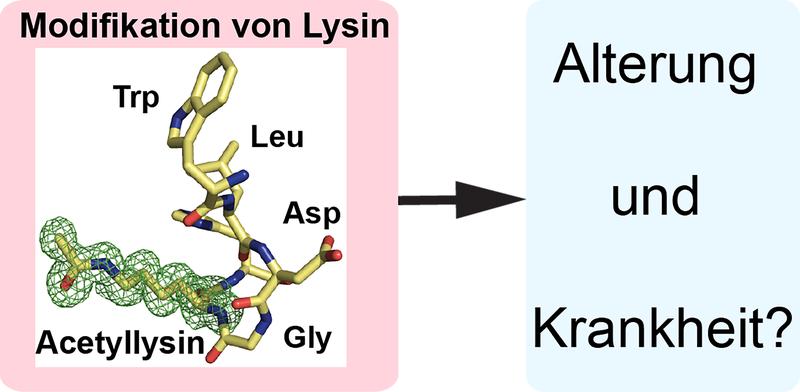
Healthy Ageing – Age-Related Protein Modifications in Cells Are Quantifiable

Illustration
Prof. Lammers
The research project was coordinated by the groups led by Prof. Dr. Chunaram Choudhary and Prof. Dr. Brian T. Weinert from the Novo Nordisk Foundation Center for Protein Research and the University of Copenhagen. The Synthetic and Structural Biochemistry research group, led by Prof. Dr. Michael Lammers, at the University of Greifswald’s Institute of Biochemistry was also involved in the project.
The study titled Analysis of human acetylation stoichiometry defines mechanistic constraints on protein regulation investigates the molecular mechanisms of a healthy ageing process. Today’s society is getting older. This is good news; but it is also related to a number of challenges for today’s society.
In addition to the significant economic effects, there are also huge health-related challenges. Age itself increases the probability of developing severe illnesses such as cancer, metabolic disorders, heart disease and neurodegenerative illnesses, more than any other risk factor.
That is why it is very important for us to understand the mechanisms that support a healthy ageing process on a molecular level.
Thanks to tests carried out on rats, we have known since the beginning of the 1930s that caloric restriction increases the lifespan of mammals. It is now presumed that it is dietary restriction that has a positive effect on life expectancy and the state of health at later stages in life, not a reduction in energy consumption.
It would be excellent if the positive effects of caloric/dietary restriction could be imitated pharmacologically using medication that would not require strict nutritional control or a constant diet. The basic mechanisms of dietary restriction are yet to have been elucidated on a molecular level.
The enormous improvement in quantitative mass spectrometry over the last ten years has made it possible to prove that caloric/dietary restriction and illnesses, such as certain types of cancer and neuro-degenerative diseases, cause changes to cellular proteins. These alterations affect a specific amino acid in the proteins, called lysine.
Minor chemical modification of the lysines in the proteins, so-called acetylation, changes the basic functions of proteins. This helps to support the development of severe illnesses.
‘It was previously impossible to determine the exact amounts of modification to the lysines in all of the proteins of one cell. But this is necessary for finding the sites that have a high physiological relevance and are altered in diseases. Finding these important sites is one of the largest challenges in this field of research and this is now possible.
This international collaboration enabled us to use a synthetic biology approach to produce proteins with acetylated lysines and to use these as internal standards for determining quantities. We will now be able to find proteins that are promising for future therapies more efficiently.’ explains Prof. Dr. Michael Lammers, one of the authors of the article and lead scientist at the Synthetic and Structural Biochemistry group at the Institute of Biochemistry.
Contact at the University of Greifswald Greifswald:
Prof. Dr. Michael Lammers
Institute of Biochemistry, Synthetic and Structural Biochemistry
Felix-Hausdorff-Str. 4, 17489 Greifswald
Tel.: +49 3834 420 4356
michael.lammers@uni-greifswald.de
Article in the journal Nature Communications (DOI: 10.1038/s41467-019-09024-0)
http://www.cpr.ku.dk/ Novo Nordisk Foundation Center for Protein Research
http://biochemie.uni-greifswald.de/forschung/forschung-in-den-arbeitskreisen/ord… Synthetic and Structural Biochemistry group at the Institute of Biochemistry, University of Greifswald












